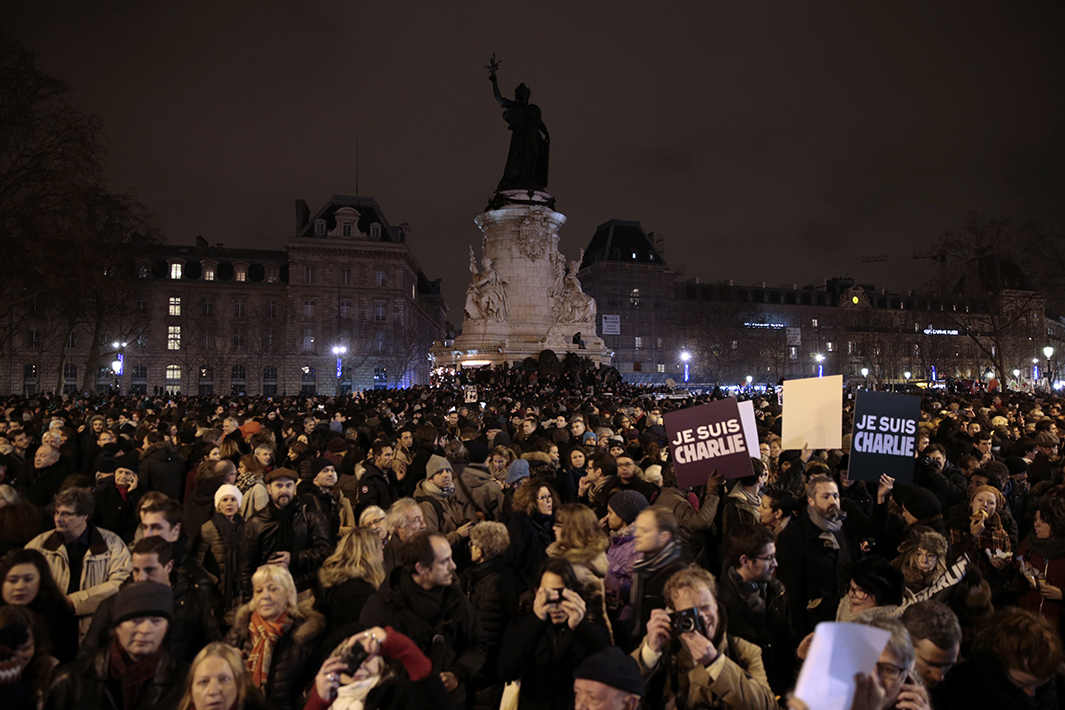Let me first say that I did not expect to be revisiting the issue of free speech so soon after examining the overblown rhetoric and jingoism surrounding Sony’s release of The Interview and the corporate cyber-vandalism immediately preceding it. It’s not as if free speech has flourished unchallenged or unscathed over the last several years. From the assassinations of journalists investigating Mexican drug cartels and government collusion and corruption to barbaric executions of journalists (and others) in Middle Eastern war zones, violence against the Fourth Estate has escalated to a level not seen in several decades.
I made reference to a different set of ‘bad players’ in my last post; but in a way they’re all playing on the same team. They all have an interest, not just in winning, but in being licensed to tell the ‘official version’ of their story, to write the history as they would like it (and themselves) to be memorialized; or, still more darkly, to blot that history out altogether.
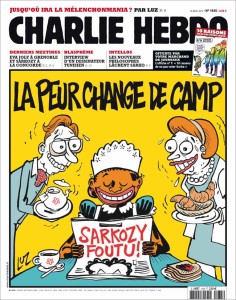 Charlie Hebdo was, among other things, about saying ‘fuck you’ to all ‘official versions’ and a few unofficial ones; sniggering at both the winner’s arrogant self-righteousness and the losers’ petty scapegoating; putting their fingers in the eyes of sanctimonious and hypocritical officialdom, lampooning their vanities and turning rocks over less conspicuous venalities—really, in the graphic terms of their magazine, leaving no stone unturned or unthrown.
Charlie Hebdo was, among other things, about saying ‘fuck you’ to all ‘official versions’ and a few unofficial ones; sniggering at both the winner’s arrogant self-righteousness and the losers’ petty scapegoating; putting their fingers in the eyes of sanctimonious and hypocritical officialdom, lampooning their vanities and turning rocks over less conspicuous venalities—really, in the graphic terms of their magazine, leaving no stone unturned or unthrown. 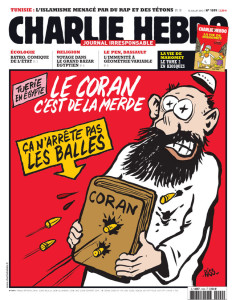
They did not spare the national symbols and sacred cows of the French Republic; and it was both moving and a little ironic to see the throngs gathered last night in the Place de la République and listen to the cathedral bells of Notre-Dame as thousands observed a moment of silence there on the Ile de la Cité. The killers had struck something at the heart of secular France, no less than the 9/11 Al-Qaeda terrorists had struck the commercial heart of the United States.
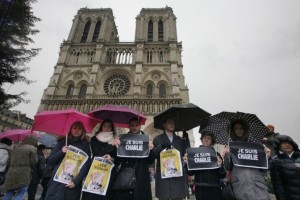 You wept for France in those brief moments—all Paris and France seemingly united in the shadow of those great symbols of church and state—symbols that once might have easily stood as targets for Charlie Hebdo’s equal opportunity desecration. To those of us sequestered far from la Ville Lumière, it almost seems a paradox central to the French national character. I only know France through the shallows of its fashion and art (and wouldn’t you know my favorite Parisian designer of the moment is originally from Los Angeles?), and would never presume to analyze its ‘traits.’ But from Voltaire and Diderot through Sartre and Camus, from Saint Simon and La Rochefoucauld to Flaubert and Proust, we observe this uncanny ability to pivot between politely precise observance of the conventional pieties, and a secular insistence on telling it like it is, frequently to the point of ridicule.
You wept for France in those brief moments—all Paris and France seemingly united in the shadow of those great symbols of church and state—symbols that once might have easily stood as targets for Charlie Hebdo’s equal opportunity desecration. To those of us sequestered far from la Ville Lumière, it almost seems a paradox central to the French national character. I only know France through the shallows of its fashion and art (and wouldn’t you know my favorite Parisian designer of the moment is originally from Los Angeles?), and would never presume to analyze its ‘traits.’ But from Voltaire and Diderot through Sartre and Camus, from Saint Simon and La Rochefoucauld to Flaubert and Proust, we observe this uncanny ability to pivot between politely precise observance of the conventional pieties, and a secular insistence on telling it like it is, frequently to the point of ridicule.
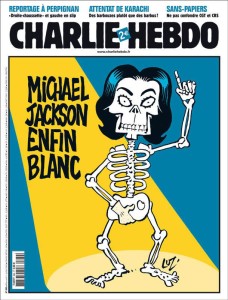 Necessarily to the point of ridicule—there are so many moments when a crude drawing (political or otherwise) carries so much raw and indelicate expression, unremarked or only superficially referenced in polite ‘mainstream’ discussion, that gives a much deeper understanding of psychological and cultural context. We need to be reminded of the ugliness—human character is not a pretty thing—especially in the political arena, even as we steer clear or avoid talking about it.
Necessarily to the point of ridicule—there are so many moments when a crude drawing (political or otherwise) carries so much raw and indelicate expression, unremarked or only superficially referenced in polite ‘mainstream’ discussion, that gives a much deeper understanding of psychological and cultural context. We need to be reminded of the ugliness—human character is not a pretty thing—especially in the political arena, even as we steer clear or avoid talking about it.
Civilization was once held together by religion; secular societies are held together by law, common necessity—and hypocrisy. There are checks on free speech (as discussed more extensively in my last post), both acknowledged and unacknowledged—some of which we saw news organizations contending with yesterday. The Associated Press notably refused to publish controversial images from the magazine. Here, only the Washington Post and the Los Angeles Times reproduced offending Charlie Hebdo covers (the Post ran with the famous ‘Sharia’ Hebdo cover—‘100 lashes if you don’t die laughing’) with caricatures of the Prophet Muhammed. Elsewhere, NBC, CNN and other television news outlets blotted out or pixelated the images. It was also noted, though, that in the U.K., The Observer had declined to publish a reproduction.
You couldn’t necessarily condemn this selective self-censorship outright. We’re all working against the backdrop of a much larger, socially/culturally entrenched problem. These are organizations trying to function in an environment in which they contend with many factors, some of them quite dangerous, and it would be foolish and irresponsible to simply disregard them. I have no doubt the memory of the soldier hacked to death in full view of passers-by on a London street by Islamic extremists was fresh in the minds of many at The Observer and elsewhere. Larger news organizations report to corporate overseers who are ultimately responsible to their shareholders. It’s one thing to deal with legal challenges; it’s quite another to stare down the barrel of a gun.
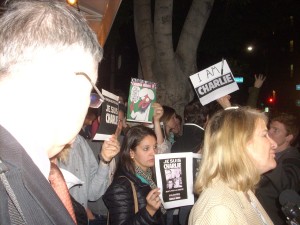 Here in Los Angeles, a number of us gathered not far from where I live at a café on Vermont Avenue for a public expression of solidarity with both the French people and, more broadly, the free press. In the style of this decade, it became almost a ‘cellphone’ memorial more than the usual candlelight vigil, with participants holding up cellphones (along with a few cardboard signs, and placards with famously controversial Charlie Hebdo covers). The cellphones displayed website messages with the hashtag line of the day, ‘Je suis Charlie,’ or ‘I am Charlie.’ There were also a few that read, ‘I am not afraid.’ (This was another hashtag line.) Brave, I thought; and hopeful—we were all clinging to hope after all that evening; and optimistic…. [to be continued]
Here in Los Angeles, a number of us gathered not far from where I live at a café on Vermont Avenue for a public expression of solidarity with both the French people and, more broadly, the free press. In the style of this decade, it became almost a ‘cellphone’ memorial more than the usual candlelight vigil, with participants holding up cellphones (along with a few cardboard signs, and placards with famously controversial Charlie Hebdo covers). The cellphones displayed website messages with the hashtag line of the day, ‘Je suis Charlie,’ or ‘I am Charlie.’ There were also a few that read, ‘I am not afraid.’ (This was another hashtag line.) Brave, I thought; and hopeful—we were all clinging to hope after all that evening; and optimistic…. [to be continued]

